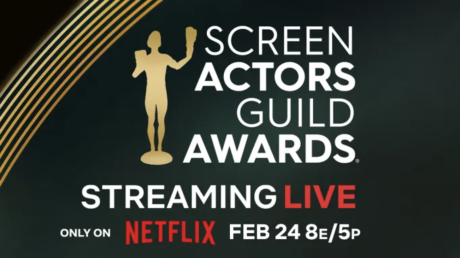Honestly? The new trailer for Kevin Costner‘s two-part Horizon: An American Saga (Warner Bros., 6.8.24 and 8.16.24) seems all over the map. It feels vague. I can’t get a handle on it. Apparently it’s about covered wagon settlers and the usual hostilities from Native Americans as the settlers make their way west during the Civil War era, but it feels more like an eight-part Max miniseries than a sprawling, big-canvas two-part theatrical.
Daily
“Michael Clayton” Hitmen Were Straight
The names of the Michael Clayton surveillance guys were “Mr. Verne” (Robert Prescott) and “Mr. Iker” (Terry Serpico). I know faces and I can sense gaydar undercurrents, and there’s no way in hell either of them were gay. They just didn’t have that faintly swishy vibe, but if they did Verne would be a top and Iker would be an ambivalent bottom. But they weren’t so forget it.

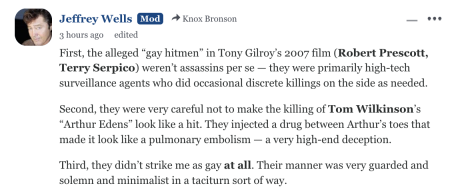

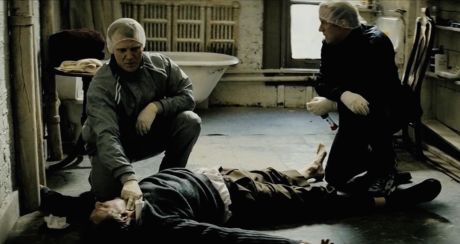
Nobody Cares About Branch Davidian Spirit Awards
For months honest, down-to-earth people have been saying that Celine Song‘s Past Lives is fine but calm down. But agenda-driven critics, various friends of A24 and industry elites pushing gender and identity activism have refused to back down, and so Past Lives has won the Best Film award at the Independent Spirit Awards.
The Past Lives fix has been in all year long…we all know that…sensitive emotions, understatement, South Korean female director…locked in tight.
Once upon a time the Spirit Awards were known as the “indie Oscars”. This handle was generally accepted — indeed celebrated — between the early ’90s to mid 20teens. But that ship began to leave port when the woke virus infected everything starting in ’17 and especially after the leadership overturned the apple cart by destroying gender acting categories.
I’m not kidding or exaggerating — talent + marketing & publicity are still playing along because “where’s the harm?”, but the Spirits have gone totally wacko, and nobody cares what they think (not really) because they’re encamped on planet Pluto.
And you know what the tragic aspect is? The Spirit Awards couldn’t get back to normal (i.e., the way things were before 2016 or thereabouts) if they wanted to. Their feet are stuck in Crazyland cement and they can’t return as the trans community nutters and their friends would burn the tent down if the Spirits tried to modify. They’ve totally fucked themselves because now everyone (not just HE) thinks of them as the Branch Davidians of the award-season realm.
The Spirit organization will persist because of the liberal elite emotional investment factor, but they’re as dead as the Sundance Film Festival…they’ve woked themselves into a corner, and all they have to look forward are cast-iron woke chains around their ankles.


Gather Round & Celebrate “The Misfits”
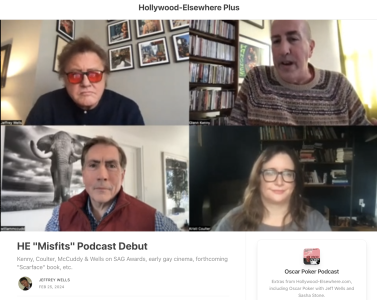
Greetings to HE fans and Oscar Poker loyalists (posted on Sunday, 2.26, 10:10 pm):
Podcast-wise longtime HE partner & soulmate Sasha Stone and I have decided to politely and graciously part company, at least for the time being.
HE’s “The Misfits” is the new deal — a Zoom video group discussion thing as opposed to the two-person audio chat that “Oscar Poker” was — it’s now three or four revolving participants per weekly episode, discussing the usual ebb and flow, twists and turns, industry razmatazz, etc.
HE founder and relentless, rat-a-tat-tat author Jeffrey Wells is, as you might expect, a locked-in, never-say-die fixture.
Today’s trio was comprised of Glenn Kenny, author of the forthcoming “The World Is Yours: The Story of Scarface”, “Exit Interview” author Kristi Coulter, and Manhattan & East Hampton movie hound, comedy writer and co-host of “Talking Pictures” co-host Bill McCuddy.
Others will join in as things evolve. We’re playing it by ear for the time being. Perhaps Jeff Sneider and Eddie Ginley will jump in next week or down the road. The door is open. I would love it if I could persuade Sasha to drop in from time to time, but that’s up to her, of course.
You have to visit HE’s Oscar Poker Substack page and join up and listen. McCuddy says 90 minutes is too long, but I’m too whipped to cut it into two segments. I’ll make sure next week’s episode is carved into two shorter segments. Again, the Substack link.
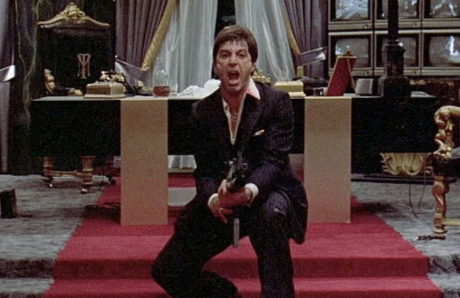
Sudden Sutton Detour
These two video clips were recorded late Sunday morning (2.25.24, 10:40 AM) at Jett, Cait and Sutton’s home in West Orange, New Jersey. They’re not newsworthy or topical or even amusing — they simply represent the happiest and most serene interlude I experienced all day. I was saying to myself “this is perfect…life can’t get any better than this.”
I left soon after recording these two clips and arrived back in Wilton around 1:15 pm or so. Less than two hours hence HE’s video Zoom capture of the debut episode of “The Misfits” (myself, Glenn Kenny, Kristi Coulter and Bill McCuddy) began — roughly 3:30 pm and ending at 5 pm, give or take.
Discussion topics included (a) “Exit Interview,” Coulter’s well-reviewed book about her 12 years at Amazon; (b) Alcoholism and addiction, and how a person feeling really and truly delighted about his/her life can be an excellent reason to start drinking again; (c) Successfully suppressing an urge to blow off 12 years of sobriety in the tragic wake of The Holdovers‘ Paul Giamatti losing SAG’s Best Actor trophy to Oppenheimer‘s Cillian Murphy, and especially KOTFM‘s Lily Gladstone elbowing aside Poor Things‘ Emma Stone to take SAG’s Best Actress award; (d) the straight-male intrigue factor (or lack thereof) in two new lesbian movies, Rose Glass‘s melodramatic and fleetingly surreal Love Lies Bleeding and Ethan Coen and Tricia Cooke‘s Drive-Away Dolls, a mildly farcical sexual odyssey set in ’99 or thereabouts; (e) Kenny’s forthcoming Scarface book, “The World Is Yours,” and a casual reciting of several making-of anecdotes, etc.
I’m currently trying to figure out how to upload our lively “Misfits” discussion, which we were quite happy with. Okay, it ran a little bit long, which prompted me to think about editing it into two segments. I’m way too much of a douchenozzle to figure this stuff out quickly, but I might manage to upload something within an hour or two….who knows?
“Misfits” Preparation
Today’s “Misfits” podcast records at 3:30 pm, and, as mentioned, will post sometime tonight or tomorrow morning.
Participants: Glenn Kenny (“The World Is Yours: The Story of Scarface‘), Kristi Coulter (“Exit Interview: The Life and Death of My Ambitious Career“), Manhattan & East Hampton movie hound and “Talking Pictures” cohost Bill McCuddy.
I’m in West Orange, New Jersey as we speak. I need to hop on the NJ Turnpike, traverse the GW Bridge and be back to Wilton no later than 1 pm.
Fair weather, blue skies and a positive attitude despite what happened last night last the SAG awards.
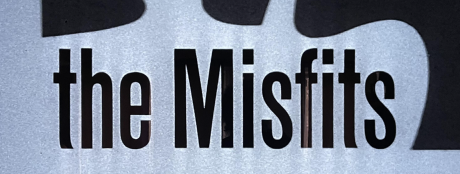
Winning For Wrong Reasons
HE to Sasha Stone: I didn’t want Lily Gladstone to “lose”. I wanted an actress who had given a truly Oscar-worthy performance to win. Was that such a bad thing?
Yes, who didn't? No one in that room wanted to watch her lose. https://t.co/VDTqYWYwbn
— Sasha Stone at Awards Daily (@AwardsDaily) February 25, 2024
Cillian Murphy Takes SAG’s Best Actor Award, Shocking Everyone
What the hell has happened to the inevitable Oscar triumph of The Holdovers’ Paul Giamatti? This was Paul’s year, his deserved payback moment for the Sideways snub of ‘05…and the SAG-AFTRA plebes have blown him off? My heart is breaking for the poor guy. Can the sardonically soulful Giamatti pull off an Oscar win regardless? You tell me. I’m really downhearted.
Stone Loses SAG Award to Gladstone…Gaaah!
Major acting awards should be about major effing delivery…grand-slamming it…soul, gravity, reaching deep inside. Not this time. Congrats to the architects of Lily Gladstone‘s identity campaign. The Best Actress Oscar is now almost certainly hers, and everyone in the room knows the meaning…the final value of this.
SAG-AFTRA awards voters have been lowering industry property values for years…onward!
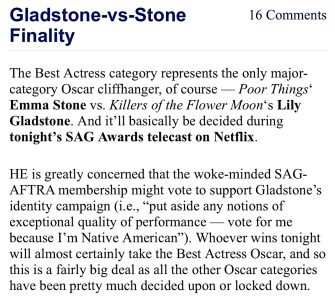
Measured Clash of Extremes
So that’s Chaya Raichik, the Libs of TikTok honcho, on the right with the pink hoodie, and masked-up Washington Post social media reporter Taylor Lorenz on the left.
In overly simple terms, we’re talking basic normie values and suspicion of unmitigated immigration of POCs from various cultures vs. unbridled wokeism (“whiteys need to be punished and brought down a peg or two”).
Zoom Agony
Yesterday HE tried to get the hang of Zoom, as the first “Misfits” Zoomcast is set for Sunday afternoon with a peek-out sometime later that evening or Monday morning.
Alas, HE mostly failed in this effort, and I am therefore grateful to Glenn Kenny for having generously offered to do the Zoom inviting, due to my woeful lack of facility with this extremely user-unfriendly software.
I spent three or four hours yesterday trying to figure out the protocols, and I’m just not smart or patient enough, it seems. And so to protect my sense of self-worth I’ve decided that it’s Zoom’s fault, not mine. As a result I’ve come to despise Zoom with a burning Ahab-like intensity.
Zoom has actually re-awakened long suppressed feelings of stupidity and self-loathing within me…feelings that I experienced when I was 13 or 14 years old and bored to death in history class. I so hated studying mind-numbing textbooks that I would invent my own answers to pop quizzes. When asked who was James Watt, the 18th Century Scottish inventor of the semi-advanced steam engine, I would answer that he was a pioneer in developing and measuring the illumination levels in electric light bulbs, hence the quantifying term “watt” as in 75-watt GE bulbs.
This was my burden, my plight, my anguish. For I was inexplicably hostile to standard terminology and accepted doctrine, and felt stubbornly inspired to defy it any way I could. And now, thanks to Zoom, I am re-living the dull panel-colony horror of being the dumb guy in class. Or, you know, an intellectually rebellious 13 year-old or whatever.
Again — HE’s very first Zoomcast will happen as planned, but only because Kenny has stepped into the breach.
Ray Bolger‘s Scarecrow: “Oh, I’m a failure because I haven’t got a brain.”

Gladstone-vs-Stone Finality
The Best Actress category represents the only major-category Oscar cliffhanger, of course — Poor Things‘ Emma Stone vs. Killers of the Flower Moon‘s Lily Gladstone. And it’ll basically be decided during tonight’s SAG Awards telecast on Netflix.
HE is greatly concerned that the woke-minded SAG-AFTRA membership might vote to support Gladstone’s identity campaign (i.e., “put aside any notions of exceptional quality of performance — vote for me because I’m Native American”). Whoever wins tonight will almost certainly take the Best Actress Oscar, and so this is a fairly big deal as all the other Oscar categories have been pretty much decided upon or locked down.
I’ll be in West Orange, New Jersey when the decision comes down. I’m prepared to accept a Gladstone victory as long as everyone understands the woke bullshit dynamic, as a Lily win would have nothing to do with her having given a knockout performance, or one that could be fairly described as fascinating, audacious, richly-written, dig-down-and-touch-our-communal-soul, etc. What can I do if SAG-AFTRA tilts this way? Obviously nothing.
